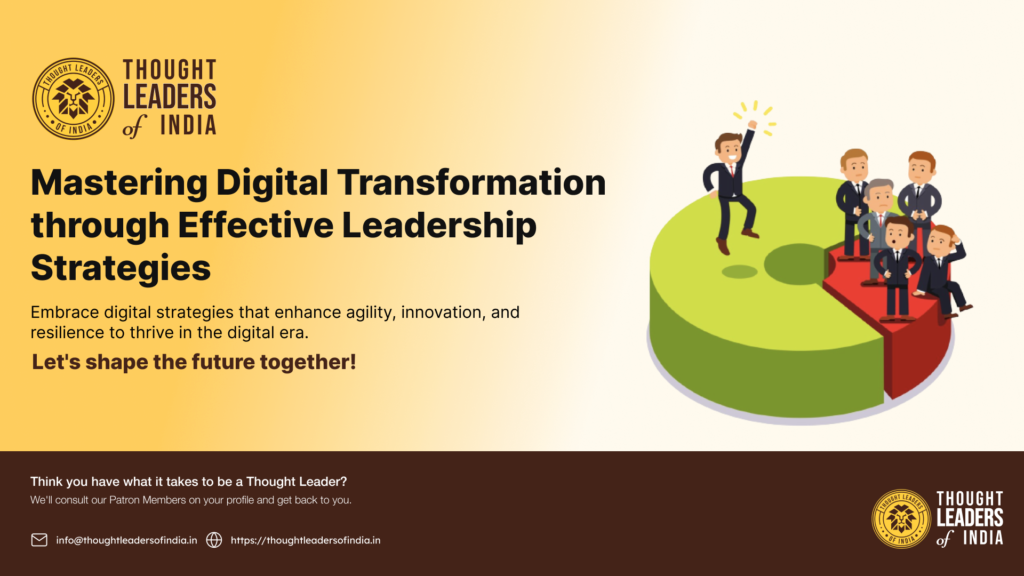In today’s rapidly evolving business landscape, digital transformation has become imperative for organizations striving to stay ahead. As CEOs, CXOs, and industry leaders, we understand the profound impact of digital leadership and the strategies needed to pave the way for sustainable growth and innovation.
Imagine a world where every decision is powered by data-driven insights, where agility and adaptability are the norm, and where customer experiences are seamlessly integrated across digital channels. This is the promise of digital transformation—a journey that reshapes industries and revolutionizes business models.
Leading your organization through this transformative journey requires a deep understanding of the digital landscape, from leveraging emerging technologies like AI and IoT to reimagining business processes and enhancing customer engagement. It’s about embracing innovation, fostering a culture of continuous learning, and empowering your teams to drive change from within.


Understanding Digital Transformation
Digital transformation is not merely adopting new technologies; it’s a journey of reimagining business models, processes, and customer experiences to harness the full potential of digital technologies. It involves integrating digital technology across all aspects of your business, fundamentally reshaping how you operate and deliver value to customers.
Imagine your business as a dynamic ecosystem, where every process, interaction, and strategy is powered by cutting-edge technology. From streamlining operations to enhancing customer experiences, digital transformation is the cornerstone of staying relevant and competitive in today’s rapidly evolving market.
At its core, digital transformation is about embracing innovation and seizing new opportunities. It’s about leveraging data-driven insights to make informed decisions, empowering your teams with the tools they need to succeed, and ultimately, driving growth and efficiency across your organization.
The Need for Digital Transformation
In India, just as in the rest of the world, businesses are awakening to the imperative of embracing digital transformation:
– Digital Adoption: According to a report by McKinsey, India’s digital adoption has been accelerating, with digital engagement and e-commerce seeing substantial growth. This surge is not merely a trend, but a fundamental shift in how businesses operate and connect with their customers.
– Competitive Advantage: Businesses that embrace digital transformation are 26% more profitable than their peers, according to the MIT Sloan Management Review. This statistic underscores the transformative impact of digital strategies on profitability and market leadership.
Key Strategies for Effective Digital Leadership
- Vision and Strategy Setting:
Effective digital leadership begins with a clear vision and strategy. Define how digital transformation aligns with your business objectives and communicate this vision across your organization.
- Building a Digital-First Culture:
Foster a culture of innovation and digital fluency. Encourage experimentation, risk-taking, and continuous learning to adapt to new digital tools and technologies.
- Customer-Centric Approach:
Use digital technologies to enhance customer experiences. Leverage data analytics and AI to personalize customer interactions and anticipate their needs.
- Agility and Adaptability:
Embrace agile methodologies to quickly respond to market changes and customer feedback. Agile organizations are 2.2 times more likely to be top performers.
- Data-Driven Decision Making:
Utilize big data and analytics to make informed decisions. Organizations that use data-driven insights are five times more likely to make faster decisions than their peers.
- Cybersecurity and Risk Management:
With increased digital adoption comes greater cybersecurity risks. Implement robust cybersecurity measures and ensure compliance with data protection regulations.
Case Studies in Digital Transformation
– Amazon: Amazon’s transformation from an online bookstore to a global e-commerce giant is a prime example of leveraging digital technologies to disrupt traditional markets.
– Tata Consultancy Services (TCS): TCS has embraced digital transformation by focusing on cloud computing, AI, and analytics, enabling them to offer innovative solutions to their clients.
Conclusion
In today’s rapidly evolving business landscape, digital transformation isn’t merely about adopting new technologies; it’s about reinventing your business to maintain competitiveness in a digital-first world. As a leader, embracing digital leadership isn’t just a choice; it’s essential for future-proofing your organization and driving sustainable growth.
Imagine your organization as a ship navigating through uncharted waters. The journey isn’t just about finding new tools or technologies; it’s about transforming your ship into one that’s faster, more agile, and better equipped to weather the storms ahead. This transformation isn’t just a trend—it’s a strategic imperative to ensure your organization not only survives but thrives in the digital age.
Leaders who embrace digital leadership are like captains who steer their ships with vision and foresight. They understand that digital transformation isn’t just about keeping up; it’s about leading the charge. It’s about leveraging technology to innovate, streamline processes, and enhance customer experiences. It’s about creating a culture of agility and continuous improvement, where every decision is guided by data and every action is aimed at driving meaningful outcomes.
At TLOI, we are committed to empowering leaders with the knowledge and insights needed to navigate digital transformation. Join our community of industry leaders, share your experiences, and gain access to exclusive content and events focused on driving digital innovation.

